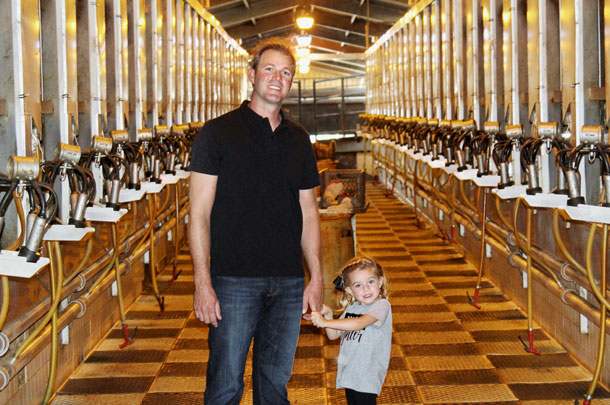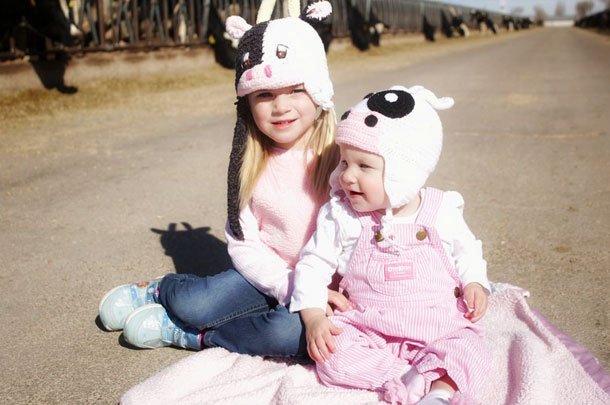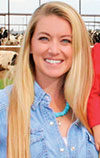I’ve learned over the years from growing up on a dairy farm and being married to a dairy farmer that dairy farmers tend to live in a bubble. We all hang out with other dairy families. We live in rural communities where most people have a connection to agriculture.
It's easy to lose touch with the general public, our consumers.
I realized this more than ever when I went away to college. Even though I was getting my degree from the College of Agriculture in environmental science, I didn’t hang out with any ag students. I joined a sorority and fully immersed myself in Greek life. Pretty much everyone was from a big city and had never been on a farm. This opened my eyes to so many different ways of life. Fast forward a few years, I moved back home, got married and started my new career in the dairy industry. And while my friends and I had scattered from coast to coast, we still kept in touch through social media.
Then I had my first daughter. Like most new moms, I had no idea what I was doing, and I had about a million questions. The first place I looked for answers (after asking my own mom) was the internet. I joined about 50 Facebook groups dedicated to motherhood, raising kids and answering mom questions. These groups bring together tens of thousands of moms from all across the country.
That is the beauty of social media – bringing together people from all over the world and all walks of life. But I started noticing more and more Facebook posts against animal agriculture. Many posts were filled with blatant lies about dairy, and my friends and people in these mom groups were liking, commenting and sharing all of this misinformation. I would ask my husband, Daniel, or other dairy friends if they were seeing these posts. They were not. Their feeds seemed to be filled with positive dairy posts from other dairy farmers and pages they’d liked.
This was when I realized dairy farmers are really good at preaching to the choir – we all talk about dairy, but we live in our bubble.

Breaking out of the ag bubble
At this point, I felt like I was spending half my day fighting small battles in the comment section of Facebook. I was trying to tell people the truth about dairy farming. We love our cows. Our dairies and our cows are our livelihood. How could I get people to understand that? I knew I needed to do something more.
Daniel and I both agreed wholeheartedly that we needed to be sharing our passion and knowledge of dairy farming. But the whole idea of blogging was scary – putting yourself and your family out there to be judged by everyone, from activists to other dairy farmers. Would we be putting our family and our farm at risk? I’d be posting not only about dairy, but about our children and our day-to-day life. Daniel tends to be a very private person. The thought of people knowing where we are and what we’re doing didn’t sound appealing to him. But ultimately, we came to the decision together to start on this journey.
After more than two years, I can say it hasn’t always been easy, but Daniel and I both know we made the right decision. We’ve had disagreements about how much to share and what to share, but our goal hasn’t changed. Together, we want to tell our dairy farm’s story.
This is a critical time in our industry
Most people have never been to a farm and don’t know any farmers. They probably don’t know anything about modern agriculture, larger farms, new technology and our priority for animal care. Right now, 7 percent of American adults think that chocolate milk comes from brown cows! As a farmer, you might laugh, but this is the reality of the world we live in.
Yet people are hungry to know where their food comes from and how it is produced. They want to be able to make educated decisions about what’s best to feed their families. Social media gives us a unique opportunity to show them.

We really can change people’s minds about dairy
So many people choose alternative milk products because they’ve seen something negative online about dairy. All it takes is one conversation with them about dairy farming to change their minds. Even if I don’t change their minds, at least they have more information directly from the farmer to make their decision.
Dairy farmers need to make themselves available for people to ask questions. I like to compare it to my first day of blogging. I had no idea how to start a website or write code. So, the first thing I did was Google “how to start a blog” and then joined some Facebook groups. It’s the exact same thing with dairy. If consumers have questions about dairy, where are they going to turn? Google. Facebook. And if dairy farmers aren’t there to tell them the truth, then I can promise you a misguided activist will be there to spread lies.
I urge dairy farmers and consumers alike to seek each other out and learn more about one another. We need to bridge this ever-growing gap between the producer and the consumer. For consumers, when you have questions about your food, find a farmer and ask them. Don’t automatically believe everything negative you see. Many things can be explained with a little context from the farmer.
The more we know about each other, the better we will understand each other. ![]()
To learn more about Tara and how she is connecting with consumers check out her blog, New Mexico Milkmaid, or follow her on Instagram.
The Real Dairy Wives series is brought to you courtesy of Dairy Max.
PHOTO 1: Tara Vander Dussen noticed anti-animal agriculture activity on social media while interacting with other mothers outside of the dairy industry.
PHOTO 2: Dairyman Daniel Vander Dussen and his wife, Tara, decided together that her blog would be an important effort to educate others about dairy farming.
PHOTO 3: The Vander Dussen children. Photos provided by Tara Vander Dussen.




